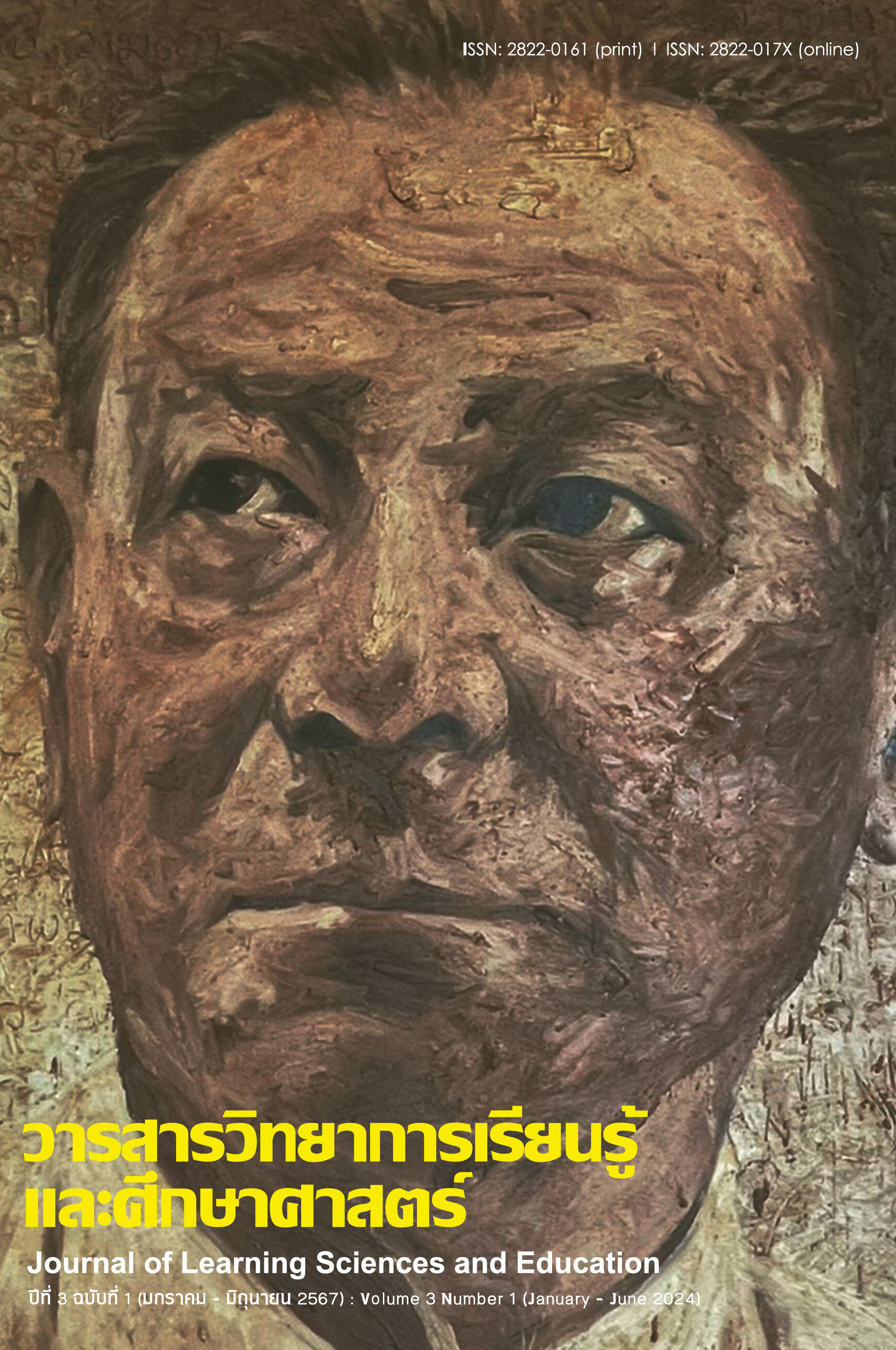แนวทางการเรียนรู้แบบนาโนเพื่อส่งเสริมทักษะการเรียนรู้ตลอดชีวิตของนักเรียนในสังคมยุควิถีถัดไป
Main Article Content
บทคัดย่อ
การวิจัยนี้มีวัตถุประสงค์ 1) เพื่อศึกษากระบวนการจัดการเรียนรู้แบบนาโนเพื่อส่งเสริมทักษะการเรียนรู้ตลอดชีวิตของนักเรียนในสังคมยุควิถีถัดไป และ 2) เพื่อเสนอแนวทางการจัดการเรียนรู้แบบนาโนเพื่อส่งเสริมทักษะการเรียนรู้ตลอดชีวิตของนักเรียนในสังคมยุควิถีถัดไป กลุ่มตัวอย่าง คือ 1) ครูผู้สอนระดับชั้นมัธยมศึกษาตอนปลาย และ 2) นักเรียนชั้นมัธยมศึกษาตอนปลาย เครื่องมือการวิจัย ได้แก่ 1) แบบวิเคราะห์เอกสาร และ 2) แบบสัมภาษณ์เชิงลึก ผลการวิจัยพบว่า 1) กระบวนการจัดการเรียนรู้มีทั้งหมด 4 ขั้นตอน ได้แก่ 1) การตั้งประเด็นเปิดความคิด (discover) 2) จุดประกายขยายมุมมอง (expand) 3) การต่อยอดความรู้ (emerge) และ 4) ทบทวนคุณค่าแก่ตนเองและผู้อื่น (review) 2) แนวทางการจัดการเรียนรู้มี 4 ด้าน ได้แก่ 1) ด้านการเตรียมความพร้อมของครู 2) ด้านการจัดกิจกรรมการเรียนรู้ 3) ด้านสื่อและแหล่งการเรียนรู้ และ 4) ด้านการวัดประเมินผล
Article Details

อนุญาตภายใต้เงื่อนไข Creative Commons Attribution-NonCommercial-NoDerivatives 4.0 International License.
เอกสารอ้างอิง
Al Shehhi, M. (2022). The use of Technology in Education: A Study About the Impact of Using Nano-Learning in Teaching English as A Foreign Language in Higher Education Institutions in the United Arab Emirates [Master’s thesis, The British University in Dubai]. https://bspace.buid.ac.ae/bitstream/handle/1234/2076/20190884.pdf?sequence=3&isAllowed=y
Bhanduaram, W., MangKhang, C., Yimsawat, C., & Wannapaisan, C. (2023). เครื่องมืออนาคตวิทยาการศึกษาเพื่อส่งเสริมทักษะการเรียนรู้ตลอดชีวิตของพลเมืองเน็กซ์ในยุควิถีถัดไป [Educational Futurology Tools to Promote Lifelong Learning Skills of Next Citizens in the Next Normal Era]. Journal of Education Studies. 51(1), 1-13.
Bronfenbrenner, U. (1977). Toward an experimental ecology of human development. American Psychology, 32, 513-531.
Chaiya, S. (2019). การพัฒนาทักษะการเรียนรู้ตลอดชีวิตของนักศึกษาในศตวรรษที่ 21 [The Developing Lifelong Learning Skills of Student in The 21th Century]. Srinakharinwirot Academic Journal of Education, 20(1), 168-180.
Department of Mental Health. (2561). คู่มือกิจกรรมพัฒนาความฉลาดทางอารมณ์ในวัยรุ่นอายุ 16-18 ปี [Activity manual for developing emotional intelligence in teenagers aged 16-18 years]. Bangkok: Beyond Publishing.
Digital Learning Institute. (n.d.). What is Nano Learning?. Retrieved March 6, 2024, from https://www.digitallearninginstitute.com/blog/what-is-nano-learning
Huachiew Chalermprakiet University. (2023). การเรียนรู้ตลอดชีวิต [Lifelong Learning]. Retrieved March 6, 2024, from https://www.hcu.ac.th/article/.
Jameel, S., & Albaiz, T. (2021). Review of the Use and Impact of Nano-Learning in Education. International Conference on Research in education, 4(1), 83-93.
Junsrithong, P. (2022). ชีวิตวิถีถัดไปกับการศึกษา [The Next Normal and Education]. Education Journal Faculty of Education, Nakhon Sawan Rajabhat University, 5(3), 25-36.
Khlaif, Z. N. & Salha, S. (2021). Using TikTok in Education: A Form of Micro-learning or Nano-learning?. Interdisciplinary Journal of Virtual Learning in Medical Sciences, 12(3), 213-218.
Kueaklang, S. (2018). องค์ประกอบและแนวทางการส่งเสริมการจัดการเรียนรู้ตลอดชีวิตของ กศน. ตำบล [factors and guidelines to facilitate lifelong learning in non-formal and informal education sub-district centers]. [Doctoral dissertation, Silpakorn University]. http://ithesis-ir.su.ac.th/dspace/bitstream/123456789/2386/1/56251803.pdf
MangKhang, C. & Kaewpanya, N. (2021). การบ่มเพาะมารยาทดิจิทัล: วิธีสอนออนไลน์เพื่อการเปลี่ยนแปลงสู่ความเป็นพลเมืองก้าวหน้าในห้องเรียนสังคมศึกษาเสมือนจริง [The Cultivating Digital Etiquette: Transformative Online Teaching Approach to Pro-Active Citizenship in the Social Studies Virtual Reality Classrooms]. Journal of Educational Innovation and Research, 6 (1), 204-213.
Mingsiritham, K. (2009). การเรียนรู้ด้วยการนำตนเองบนเครือข่าย [Self-directed Learning on Web-based Learning]. Journal of Education Khon Kean University, 32(1): 6-13.
Namdej, N. (2014). การเรียนรู้โดยผู้เรียนนำตนเอง [Self-Directed Learning]. Thai Dental Nurse Journal, 25(2), pages 27-38.
Office of the Education Council. (2022). สภาวะการศึกษาไทย ปี 2564 สถาวการณ์การจัดการศึกษาตามแผนการปฏิรูปประเทศด้านการศึกษา [Education situation in Thailand in 2021: Education management status under the national education reform plan]. Bangkok: Office of the Education Council.
Office of the Education Council. (2022). เทรนด์การศึกษาในปี 2023 [Education trends in 2023]. Retrieved October 28, 2022, from https://www.facebook.com/photo.php?fbid=447607367505853&id=100067697803075&set=a.439916994941557
Phromsiri, A. (2020). แผนการจัดการเรียนรู้รายวิชาการยศาสตร์กับการออกแบบภายในเพื่อให้สอดคล้องกับวิถีความปกติรูปแบบใหม่ยุคหลังโควิด-19 [the learning management for ergonomics for interior design in accordance with new normal of practices post covid-19]. Proceedings of SPU Educational transformation to the new normal. July 31, 2020. 310-320.
Ronsiri, S. (2018). การพัฒนาตัวบ่งชี้การเรียนรู้ตลอดชีวิตของพลเมืองไทยด้วยกระบวนการมีส่วนร่วมของชุมชน [development of lifelong learning indicators for Thai citizens using community participation process]. [Doctoral dissertation, Chulalongkorn University. https://digital.car.chula.ac.th/chulaetd/2852
Srisuwan, P. (2023). การพัฒนากิจกรรมการเรียนรู้แบบเน้นงานปฏิบัติร่วมกับการเรียนรู้แบบพอดีคําเพื่อ ส่งเสริมความสามารถด้านการพูดสื่อสารสำหรับนักเรียนชั้นประถมศึกษาปีที่ 3 [A development of learning activity by using task based learning combined with Nano-learning to enhance speaking ability for prathomsuksa 3 students]. [Master’s Independent Study, Naresuan University]. https://nuir.lib.nu.ac.th/dspace/handle/123456789/5849
Study International. (2021). Is Nano-learning the way forward?. Retrieved May 18, 2021, from https://studyinter national.com/news/nanolearning-pros-cons/
Suthasinobon, K. (2015). ห้องเรียนกลับด้าน [Flipped Classroom]. Encyclopedia of Education, faculty of Education, Srinakharinwirot University, 50(2015), 115-128.
Techtalkthai. (2023). 10 เทรนด์ EdTech แห่งปี 2023: เทคโนโลยีการศึกษาเพื่อการเรียนรู้ยุคใหม่ [10 EdTech trends of 2023: Educational technology for modern learning.]. Retrieved March 6, 2024, from https://www.techtalkthai.com/10-edtech-trends-2023/
Väätäjä, J. & Ruokamo, H. (2021). Conceptualizing dimensions and a model for digital pedagogy. Journal of Pacific Rim Psychology, 15(1), 1-12.
Vivekananth, P. (2022). Nano learning: A New Paradigm Shift in Teaching and Learning. International Journal of Engineering and Management Research, 12(1), 112-114.
Wisetdonwai, J. (2022). การศึกษายุคหลังโควิดจะใช้โลกทั้งใบเป็นห้องเรียน ด้วยการเรียนรู้แบบนำตนเอง [Education in the post-COVID era will use the entire world as a classroom. with self-directed learning]. Retrieved March 6, 2024, from https://www.educathai.com/knowledge/articles/535
Wongyai, W. & Patphol, M. (2021). การเรียนรู้แบบนำตนเองเชิงสร้างสรรค์ [Creative self-directed learning]. Bangkok: Innovative Leaders Center in Curriculum & Learning, Graduate School, Srinakharinwirot University


